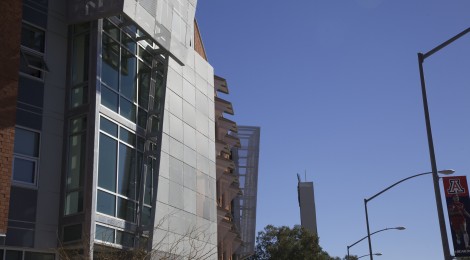
U of A Office of Sustainability
Mosaic members Nick, Kaitlin, Justin, and I had the wonderful opportunity to meet with the interim director of the University of Arizona’s Office of Sustainability, Jesse Minor. Mr. Minor is in a unique position, as he is currently pursuing his PHD at the university while also serving as the director of the Office of Sustainability.
An overarching theme of our talk with Mr. Minor was the influence and impact that student interest can have at a university. Just as student interest drives many of the institutional and extracurricular initiatives at Dickinson, student interest in sustainability led to the establishment of the Office of Sustainability in 2007, and all of the projects the office oversees are designed by students. Student-driven sustainability-related projects at the University of Arizona range from the installation of solar panels on golf carts used around campus to massive composting and recycling efforts that have had enormous impacts on the university’s ecological footprint. When asked about the future of sustainability initiatives at the university, Mr. Minor chuckled and explained that the future is in the hands of the students. The success of the Office of Sustainability is directly related to the level of creativity and interest exhibited by students.
Something that we found particular interesting was the green fee that is “chipped” away from students’ tuition. A survey was completed by U of A students that asked them how much they would be willing to pay to see improvements in sustainability programs at the university, and the highest response rate was the highest amount on the survey. Now, $12 is chipped away from students’ overall yearly bills and collected into a Green Fund. Thanks to U of A’s size, this totals to more than $400,000 each year. A board of about a dozen students allocates this money to student designed and organized projects that have sustainability focuses. Although Dickinson is a much smaller school, this may be a model that administration could consider in order to help fund student-driven projects.
Mr. Minor expressed to us how change can take a long time to happen at collegiate institutions, but with the right reasons and enthusiastic support, a lot can happen quite quickly. We will harness that optimism as we move forward with our sustainable entrepreneurship program ambitions.
That’s incredible Matt! It reminds me of a quote by Mahatma Gandhi – “Be the change that you wish to see in the world.”